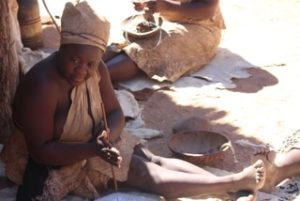Before this study abroad experience the idea of collectivism, or the idea of valuing the community over individual desires, was never something I had ever deeply pondered. In the United States, though we may at times claim pride in our unity as a nation, individualism is really the ideology that reigns supreme. From how our capitalistic economy operates to how our government manages its day-to-day functions, people most often operate within the scope of the “survival of the fittest” principle. As a U.S. citizen, I was brought up in a society that emphasizes preservation of self over community, I was expecting to find the same thing in Namibia. However, what I discovered disproved every preconceived notion I had about this young nation.
Namibia’s collectivist ideals, from what I have observed, stem directly from their brief, but impactful history. Namibia as a country is only about 30 years old and is still developing in many ways. During the time before their independence, the nation was in a period of time referred to as the Apartheid. This was a period when intense segregation divided the various ethnic groups that inhabited the area. There was a great deal of tension between European settlers and native tribes. As a result of this conflict, roughly 22 percent of the country was established as “communal land” following independence. These communal lands now are home to more than 65 percent of Namibia’s population.

A Damara woman using tools to craft traditional tribal jewelry at the Damara Living Museum, located roughly ten kilometers from the World Heritage Site of Twyfelfontein in Namibia.
Honestly, when I first heard the term “communal land,” I initially thought of it as land that nobody owned. In reality, the opposite is true and it is better explained as land available for the community to inhabit. Certain areas are carved out specifically for particular tribes such as the Damaras. Though for some nomadic tribes, such as the Himbas or Bushman, movement was limited when communal land was established. This sounds similar to the Indian reservations established in the U.S. after the Indian Allotment Act; however, the key difference is that the tribes were not forced into areas against their will. The communal lands in Namibia are areas that the native tribes inhabited for generations. They were not forced into areas that lacked resources for their use. As a result, many tribes still have the opportunity to practice their culture without interference from others.

Living Desert Excursion tour guide, Chris, gazes over the sandy dune landscape of Dorob National Park, located north of the settlement of Swakopund in Namibia at dusk.
Collectivism is something that can be realized only when every member of the community can find a reason to cooperate with one another. Culture is a prime example of something that all Namibian’s value deeply. Other examples of things that Namibians hold dear include the country’s environment and native wildlife. All citizens value culture and their natural resources as documented in Namibia’s constitution; they are able to come together and focus their effort on preserving what they hold dear. That in and of itself is the very definition of collectivism.
U.S. citizens often look for ways in which we can aid other countries, and yet we still have so much to learn as a nation ourselves. Namibia sets an example that other nations should strive to follow. Perhaps if the United States operated as a collectivist society there would be no such thing as LBGT pride, but rather pride in our nation as a whole. Citizens would understand that it’s not only Black Lives that matter, but the lives of people in general. Collectivism is about understanding and respecting our differences to collaborate for the good of everyone. It is the ideal Namibians live by every day and an ideal every nation should aspire to achieve.